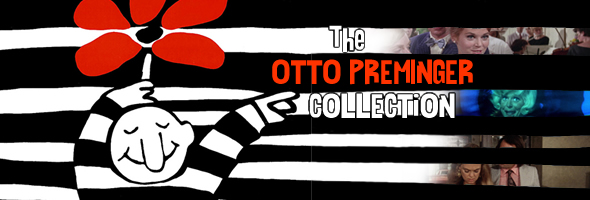
HURRY SUNDOWN
Color, 1967, 146m.
Directed by Otto Preminger
Starring Michael Caine, Jane Fonda, John Phillip Law, Diahann Carroll, Robert Hooks, Faye Dunaway, Burgess Meredith, George Kennedy
SKIDOO
Color, 1968, 97m.
Directed by Otto Preminger
Starring Jackie Gleason, Carol Channing, Frankie Avalon, Fred Clark, Michael Constantine, Frank Gorshin, John Phillip Law, Peter Lawford, Alexandra Hay, Burgess Meredith, George Raft, Cesar Romero, Austin Pendleton, Mickey Rooney, Groucho Marx
SUCH GOOD FRIENDS
Color, 1971, 101m.
Directed by Otto Preminger
Starring Dyan Cannon, James Coco, Jennifer O'Neill, Ken Howard, Nina Foch, Laurence Luckinbill, Louise Lasser, Burgess Meredith
Olive Films (Blu-Ray & DVD) (US RA/R1 HD/NTSC) / WS (2.35:1 / 1.78:1) (16:9)

The trajectory of classic Hollywood directors when confronted with the upheaval of the late '60s produced some pretty fascinating case studies, but none were more bizarre or compelling than Otto Preminger. A notorious taskmaster on his sets, Preminger shot to fame with the 1944 film noir classic Laura and turned out a string of success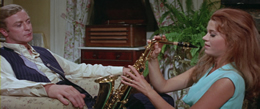 ful musicals, thrillers, and dramas for another two decades. He was also one of the most visible troublemakers bucking against the Production Code thanks to films like The Man with the Golden Arm, The Moon Is Blue, Anatomy of a Murder, and Advise & Consent, all of which dabbled in taboo subject matter.
ful musicals, thrillers, and dramas for another two decades. He was also one of the most visible troublemakers bucking against the Production Code thanks to films like The Man with the Golden Arm, The Moon Is Blue, Anatomy of a Murder, and Advise & Consent, all of which dabbled in taboo subject matter.
Preminger's desire to push the envelope and sympathize with the underdog, especially those bucking cultural trends, is the primary force behind three of his later films collected in Olive Films' Blu-Ray set, The Otto Preminger Collection. 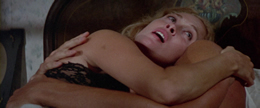 (Each is also available separately on DVD.) The first is the film most often cited as the dividing line in Preminger's career between his respected Hollywood classics and his swerve into uncommercial madness, Hurry Sundown, which inspired critics to break out the brickbats thanks to its odd casting of Michael Caine as Henry Warren, a deep-fried Southern draft dodger who decides to use any means necessary to swipe two essential plots of land in Georgia for a cannery looking to expand its business. Along with his hot-to-trot wife, Julie Ann (Fonda), he tries to manipulate the locals to force the hands of the rightful sharecropper land owners, white Rad and Lou McDowell (Law and Dunaway) and black Reeve Scott (Hooks). Toss a shady sheriff (Kennedy) and a bigoted judge (Meredith) into the mix, and you've got the recipe for a sweaty, screaming explosion.
(Each is also available separately on DVD.) The first is the film most often cited as the dividing line in Preminger's career between his respected Hollywood classics and his swerve into uncommercial madness, Hurry Sundown, which inspired critics to break out the brickbats thanks to its odd casting of Michael Caine as Henry Warren, a deep-fried Southern draft dodger who decides to use any means necessary to swipe two essential plots of land in Georgia for a cannery looking to expand its business. Along with his hot-to-trot wife, Julie Ann (Fonda), he tries to manipulate the locals to force the hands of the rightful sharecropper land owners, white Rad and Lou McDowell (Law and Dunaway) and black Reeve Scott (Hooks). Toss a shady sheriff (Kennedy) and a bigoted judge (Meredith) into the mix, and you've got the recipe for a sweaty, screaming explosion.
Aesthetically this is a direct descendant of overcooked Southern melodramas Hollywood liked to whip up now and then as showcases for its rising stars, with Fonda already getting a couple of passes at this already in Walk on the Wild Side and The Chase. Still at the height of her sex kitten phase, she easily gets the most memorable moment here doing a lewd scene with Caine's saxophone and totally overshadowing a young Dunaway, making her feature film debut. (She was signed to a multi-picture deal with Preminger but got out of her contract after the success of Bonnie and Clyde.)
The pairing of Dunaway with John Phillip Law (who would reunite with Fonda for Barbarella) is truly bizarre here, as their panting love scenes feel more like something out of a Jacqueline Susann book than a tweak at censors' noses. It's certainly never dull though, and with a cast like that, you might actually doubt what you're seeing onscreen half the time. Released by Paramount and kept off t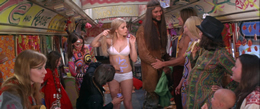 he home video market for decades after a handful of TV airings, this potboiler looks just fine in HD. The wide Panavision photography has an odd case of what used to be called the CinemaScope mumps with the lenses causing some medium and close up shots to horizontally distort; if you've ever seen a '50s Fox film, you'll recognize that look.
he home video market for decades after a handful of TV airings, this potboiler looks just fine in HD. The wide Panavision photography has an odd case of what used to be called the CinemaScope mumps with the lenses causing some medium and close up shots to horizontally distort; if you've ever seen a '50s Fox film, you'll recognize that look.
Apparently deciding what he needed was even more star power for his next project, Preminger spotted what seemed like a sure thing with the flower power movement and decided to 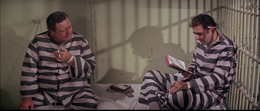 embark on an all-out comedy, Skidoo. The film became an instant novelty piece for its stunt casting of stalwarts like Jackie Gleason (who drops acid) and Carol Channing, cast here as a former gangster, Tony Banks, and his wife, Flo. One night at home, Tony is visited by his old cronies (worked from a kingpin named God, played by Groucho Marx!) and talked into performing a hit by going into prison and taking out a gangster named "Blue Chips" Packard (Rooney). Meanwhile Tony's daughter, Darlene (Model Shop's Hay), is spending time lighting up and dropping out with a bunch of hippies (led by John Phillip Law again), and Flo decides to take matters into her own hands when Tony gets stuck in Alcatraz by trying to seduce one of God's protegees (Avalon) and finally popping on a sailor hat to commandeer a fleet to God's yacht. But by that point Tony's palled up with a draft dodger cell mate (Pendleton) who arranges their escape by dosing the guards with LSD and floating off in airborne trash cans.
embark on an all-out comedy, Skidoo. The film became an instant novelty piece for its stunt casting of stalwarts like Jackie Gleason (who drops acid) and Carol Channing, cast here as a former gangster, Tony Banks, and his wife, Flo. One night at home, Tony is visited by his old cronies (worked from a kingpin named God, played by Groucho Marx!) and talked into performing a hit by going into prison and taking out a gangster named "Blue Chips" Packard (Rooney). Meanwhile Tony's daughter, Darlene (Model Shop's Hay), is spending time lighting up and dropping out with a bunch of hippies (led by John Phillip Law again), and Flo decides to take matters into her own hands when Tony gets stuck in Alcatraz by trying to seduce one of God's protegees (Avalon) and finally popping on a sailor hat to commandeer a fleet to God's yacht. But by that point Tony's palled up with a draft dodger cell mate (Pendleton) who arranges their escape by dosing the guards with LSD and floating off in airborne trash cans. 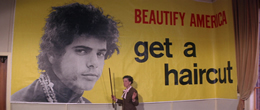
Still so weird it's hard to believe it even exists, Skidoo has amassed a pretty healthy cult following over the years despite Paramount's complete lack of interest in reissuing it in any format. Say what you will, the movie is a huge amount of fun in the right frame of mind; even its most dubious decisions (like putting Channing in revealing, see-through undies not once but twice) are more camp y and endearing now. Perhaps the most clever decision of the entire production was handing over soundtrack duties to the brilliant Harry Nilsson, who comes up with everything from TV jingles to a "garbage can ballet" to a tender ballad ("I Will Take You There"). Nilsson even cameos as one of the dosed prison guards, though the singer/songwriter was really only familiar with alcohol and wound up playing the scene far more drunk than tripped out. However, his finest moment in the film comes at the end when he supplies a song version of the end credits, vocally skipping through all the cast and crew members just after the chaotic rendition of the title song aboard God's yacht (which apparently belong to John Wayne in real life). It's also a real pop culture mindblower to think about Preminger, who had briefly played Mr. Freeze on the Batman TV show two years earlier, reeling some of that show's co-stars in here like Meredith, Frank Gorshin, and Cesar Romero. If you can believe it, this movie actually makes that show look subdued by comparison.
y and endearing now. Perhaps the most clever decision of the entire production was handing over soundtrack duties to the brilliant Harry Nilsson, who comes up with everything from TV jingles to a "garbage can ballet" to a tender ballad ("I Will Take You There"). Nilsson even cameos as one of the dosed prison guards, though the singer/songwriter was really only familiar with alcohol and wound up playing the scene far more drunk than tripped out. However, his finest moment in the film comes at the end when he supplies a song version of the end credits, vocally skipping through all the cast and crew members just after the chaotic rendition of the title song aboard God's yacht (which apparently belong to John Wayne in real life). It's also a real pop culture mindblower to think about Preminger, who had briefly played Mr. Freeze on the Batman TV show two years earlier, reeling some of that show's co-stars in here like Meredith, Frank Gorshin, and Cesar Romero. If you can believe it, this movie actually makes that show look subdued by comparison.
Preminger's love affair with scope photography was well established by this point (going back to such lavish Fox productions as Carmen Jones and River of No Return), and he really pulls out all the stops here with a string of wild, eye-popping compositions loaded with gaudy colors. It's a pretty amazing film to watch even when you have no idea what's going on, and the Olive Films presentation is a major revelation if you've only c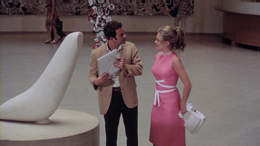 aught this in brutally cropped TV broadcasts. Great stuff, and easily worth picking up the set just for this title alone. Unfortunately there are no extras, though you can find the amazing theatrical trailer (featuring LSD guru Timothy Leary, who actually dosed up with Preminger while prepping for the film) on the original Ban 1 version of 42nd Street Forever.
aught this in brutally cropped TV broadcasts. Great stuff, and easily worth picking up the set just for this title alone. Unfortunately there are no extras, though you can find the amazing theatrical trailer (featuring LSD guru Timothy Leary, who actually dosed up with Preminger while prepping for the film) on the original Ban 1 version of 42nd Street Forever.
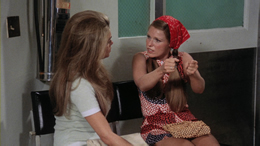 For some reason Preminger's next Paramount title is missing in action here (the Liza Minnelli drama Tell Me That You Love Me, Junie Moon), so the third and final disc instead hops over to his last film for the studio, Such Good Friends. Barely seen during its initial release, the film was based on a screenplay by Elaine May (credited as "Esther Dale" on the final version as her work was apparently changed considerably in the process) and managed to earn some notoriety in the '80s when it turned up in the Medveds' The Golden Turkey Awards as their pick for the worst nude scene of all time, courtesy of a bare-assed Burgess Meredith (yep, again) getting down and funky during a New York rooftop party early in the film. (It's actually a daydream sequence and played for laughs, and fortunately the visual onslaught only lasts briefly.) That's one of the many flights of fancy experienced by our heroine, Julie (Cannon), who's married to a literary jack-of-all-trades (Luckinbill) splitting his time between editing and writing kids' books. Unfortunately hubby's seemingly simple hospital visit to get a mole removed proves to be far more serious when he falls into a coma, and Julie finds he
For some reason Preminger's next Paramount title is missing in action here (the Liza Minnelli drama Tell Me That You Love Me, Junie Moon), so the third and final disc instead hops over to his last film for the studio, Such Good Friends. Barely seen during its initial release, the film was based on a screenplay by Elaine May (credited as "Esther Dale" on the final version as her work was apparently changed considerably in the process) and managed to earn some notoriety in the '80s when it turned up in the Medveds' The Golden Turkey Awards as their pick for the worst nude scene of all time, courtesy of a bare-assed Burgess Meredith (yep, again) getting down and funky during a New York rooftop party early in the film. (It's actually a daydream sequence and played for laughs, and fortunately the visual onslaught only lasts briefly.) That's one of the many flights of fancy experienced by our heroine, Julie (Cannon), who's married to a literary jack-of-all-trades (Luckinbill) splitting his time between editing and writing kids' books. Unfortunately hubby's seemingly simple hospital visit to get a mole removed proves to be far more serious when he falls into a coma, and Julie finds he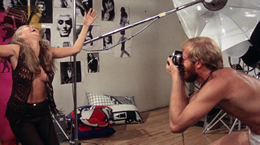 rself surrounded by friends trying to comfort her in a variety of ways ranging from the spacey to the predatory. That includes a couple of near-extramarital encounters, one with undie-clad shutterbug Ken Howard (way before The White Shadow) and another with middle-aged sad sack James Coco, and when she comes across her spouse's little black book suggesting a string of flings on the side, she really starts to wonder what her life's all about.
rself surrounded by friends trying to comfort her in a variety of ways ranging from the spacey to the predatory. That includes a couple of near-extramarital encounters, one with undie-clad shutterbug Ken Howard (way before The White Shadow) and another with middle-aged sad sack James Coco, and when she comes across her spouse's little black book suggesting a string of flings on the side, she really starts to wonder what her life's all about.
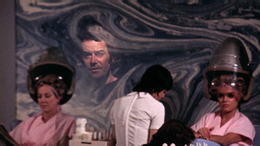 Unlike Preminger's previous films, this one actually earned some pretty decent notices (Roger Ebert even gushed over it and awarded four stars). Preminger doesn't seem like the most obvious choice for black comedy, and while one can only wonder what May's original treatment was like (she wrote and directed A New Leaf the same year and had an even more traumatic experience in the process), there's an amusing early '70s urban vibe here that occasionally feels like a dry run for what would soon come from the likes of Woody Allen and Henry Jaglom. The fact that early Allen muse Louise Lasser pops up her for another funny character turn adds to that feeling, and if you remember that this is basically a modest character study with a little fashionable women's lib thrown in, you'll have a pretty good time.
Unlike Preminger's previous films, this one actually earned some pretty decent notices (Roger Ebert even gushed over it and awarded four stars). Preminger doesn't seem like the most obvious choice for black comedy, and while one can only wonder what May's original treatment was like (she wrote and directed A New Leaf the same year and had an even more traumatic experience in the process), there's an amusing early '70s urban vibe here that occasionally feels like a dry run for what would soon come from the likes of Woody Allen and Henry Jaglom. The fact that early Allen muse Louise Lasser pops up her for another funny character turn adds to that feeling, and if you remember that this is basically a modest character study with a little fashionable women's lib thrown in, you'll have a pretty good time.
Once again the feature-only Blu-Ray looks quite nice, taken from what appear to be well-preserved 35mm materials from the Paramount vaults that have probably been untouched for decades. This one was probably the least seen title of the three for many, many years, so it's nice to have it back in circulation looking fresher than most people probably saw it first run. The packaging for the set also reflects the contributions for all three films from regular Preminger marketing collaborator Saul Bass, the brilliant graphic and titles designer who came up with some of the director's most innovative, striking campaigns dating back to Carmen Jones and The Man with the Golden Arm.
Reviewed on March 18, 2013.












